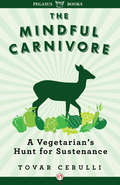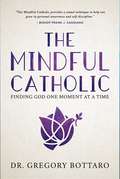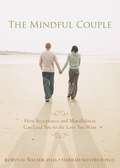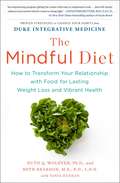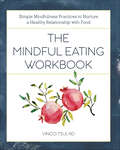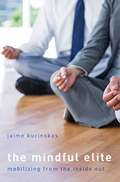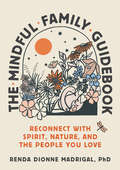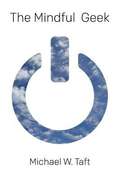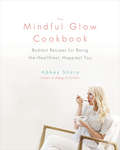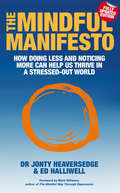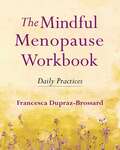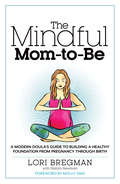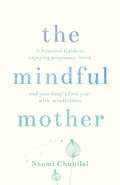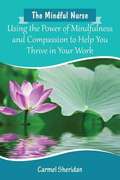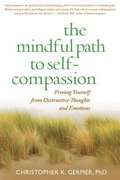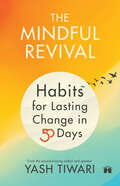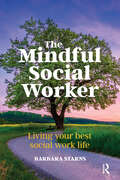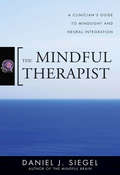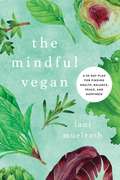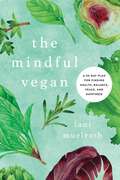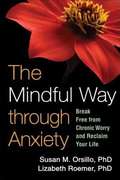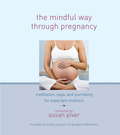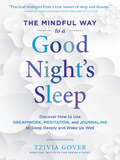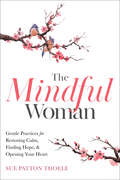- Table View
- List View
The Mindful Carnivore
by Tovar CerulliA vegan-turned-hunter reignites the connection between humans and our food and continues the dialogue begun by Michael Pollan and Barbara Kingsolver.While still in high school, Tovar Cerulli experimented with vegetarianism and by the age of twenty, he was a vegan. Ten years later, in the face of declining health, he would find himself picking up a rifle and heading into the woods. Through his personal quest, Tovar Cerulli bridges disparate worldviews and questions moral certainties, challenging both the behavior of many hunters and the illusion of blamelessness maintained by many vegetarians. Drawing on personal anecdotes, philosophy, history and religion, Cerulli shows how America's overly sanitized habits of consumption and disconnection with our food have resulted in so many of the health and environmental crises we now face.
The Mindful Catholic: Finding God One Moment At A Time
by Greg Bottaro2018 Catholic Writer's Guild Award Winner! Whether we are carrying out routine life behaviors, trying to pray, or conversing with others, the way our minds work significantly impacts how well we function. But many times we may feel like our mind has a mind of its own. -- You fall into bed exhausted at the end of the day, craving a good night's sleep, only to have your mind race in a million directions. -- Prayer is an exercise in futility, full of distractions and wandering thoughts. -- In the midst of a conversation, you suddenly realize you haven't heard a word the other person has said. -- You arrive at a destination with no recollection of how you got there. These all-too-common occurrences are examples of of how our minds can seem to be completely out of our control. We end up merely going through the motions day after day, feeling anxious and preoccupied. But it doesn't have to be that way. Dr. Greg Bottaro explains how mindfulness can help us become aware of the present moment and accept it. Catholic mindfulness is a way to practically trust God more in our lives. Instead of separating faith from day-to-day life, mindfulness helps bridge the gap so we can feel the sense of safety and peace God intends us to have. Following the simple exercises in this book, you'll discover how mindfulness can help you be more present to everything in your life from a trip to the grocery store or relaxing with friends to listening more attentively to a homily or meditating on the mysteries of the Rosary.
The Mindful Couple: How Acceptance And Mindfulness Can Lead You To The Love You Want
by Robyn D. Walser Darrah WestrupAll of us want to be fully accepted in our relationships, yet it can be difficult to fully accept our partners for who they are. This insightful guide for couples is based on a simple concept: Act out of kindness, love, and acceptance, and you will open your relationship for the creation of greater kindness, love, and acceptance. With strategies drawn from acceptance and commitment therapy (ACT), a powerful therapeutic approach, this book will help you identify your core values and discover, as a couple, the beauty that is available to you and your partner when you bring greater awareness and values-guided behavior to your relationship. Each chapter explores a key issue, such as passion, fidelity, and the balance between dependence and independence, and includes specific practices you can do alone or with your partner to help you build a vital relationship.
The Mindful Diet: How to Transform Your Relationship with Food for Lasting Weight Loss and Vibrant Health
by Tania Hannan Ruth Wolever PhD Beth Reardon MS, RD, LDN“An essential, must-read guide” (Dr. Susan Albers, New York Times bestselling author of Eating Mindfully) from the renowned Duke Integrative Medicine center: the first book to combine health psychology with cutting-edge nutrition research to deliver an up-to-the-minute method for eating mindfully and breaking the yo-yo diet cycle.It’s easy on occasion to eat too much, eat too quickly, eat for comfort, or choose junk food. But every year millions of Americans vow to lose weight and get healthy and aren’t able to overcome the largest roadblock to these changes—ingrained eating habits. Now two leading experts from Duke Integrative Medicine offer a new paradigm for eating and health—a step-by-step program that dismantles old patterns, provides new tools for making healthy choices, and fosters deep, internal motivation. Grounded in scientific research, The Mindful Diet examines how what we eat and drink affects our body on a biochemical level, and how we can become aware of our own internal signals through the practice of mindfulness. Loaded with concrete meditation exercises, behavioral techniques, nutrition advice, and meal-planning charts, this book provides the tools to manage cravings, curb emotional overeating, and figure out when you are full. Instead of an all-or-nothing approach to eating, The Mindful Diet focuses on the many variables that drive our habits—including stress, unhappiness, and even unconscious beliefs—and provides a roadmap for sustainable change. “This is not an eat this, don’t eat that program; rather, it’s an attack on the negative thoughts and patterns that lead to diet failure” (Publishers Weekly). Lasting weight loss and healthy living begin in the mind: now you can learn how to re-program your body, make healthy choices, lose weight, and keep it off for life.
The Mindful Eating Workbook: Simple Mindfulness Practices to Nurture a Healthy Relationship with Food
by Vincci TsuiEstablish a practice of mindful eating with actionable strategies and exercises from The Mindful Eating Workbook.Eating mindlessly is easy—eating mindfully takes practice. The Mindful Eating Workbook offers actionable, mindfulness-based strategies and exercises to adopt a mindful eating practice and nurture a healthy relationship with food.Vincci Tsui, a "non-diet" dietitian and certified Intuitive Eating counselor, offers step-by-step guidance to core concepts and philosophies of mindful eating. Applying theory to practice, this mindful eating workbook uses a combined approach of reflective exercises and strategies to reconnect you with your body and your needs.The Mindful Eating Workbook includes:Mindful eating 101 explores the lifelong benefits of eating mindfully, and outlines how you can bring this practice into your life.Real strategies to practice mindfulness while cooking and eating, and using mindfulness to recognize your body's signals.Reflective exercises that include assessments, journal entries, and observation logs to keep track of your journey and progress.Savoring flavors, intuitively nourishing your body, and appreciating food's true purpose to provide energy—mindful eating isn't a diet, it is a way of life. Start practicing mindful eating with The Mindful Eating Workbook.
The Mindful Elite: Mobilizing from the Inside Out
by Jaime KucinskasMindful meditation is now embraced in virtually all corners of society today, from K-12 schools to Fortune 100 companies, and its virtues extolled by national and international media almost daily. It is thought to benefit our health and overall well-being, to counter stress, to help children pay attention, and to foster creativity, productivity and emotional intelligence. Yet in the 1960s and 1970s meditation was viewed as a marginal, counter-cultural practice, or a religious ritual for Asian immigrants. How did mindfulness become mainstream? <p><p> In The Mindful Elite, Jaime Kucinskas reveals who is behind the mindfulness movement, and the engine they built to propel mindfulness into public consciousness. Drawing on over a hundred first-hand accounts with top scientists, religious leaders, educators, business people and investors, Kucinskas shows how this highly accomplished, affluent group in America transformed meditation into an appealing set of contemplative practices. Rather than relying on confrontation and protest to make their mark and improve society, the contemplatives sought a cultural revolution by building elite networks and advocating the benefits of meditation across professions. Yet, spreading the Dharma far and wide came with unintended consequences and this idealistic myopia came to reinforce some of the problems it originally aspired to solve. <p><p> A critical look at this Buddhist-inspired movement, The Mindful Elite explores how elite movements can spread and draws larger lessons for other social, cultural, and religious movements across institutions and organizations.
The Mindful Family Guidebook: Reconnect with Spirit, Nature, and the People You Love
by Renda Dionne MadrigalTurn off screentime and come back to earth with this family mindfulness guidebook from Chippewa clinical psychologist Renda Dionne Madrigal, PhD, and reconnect with your family through time-honored mindfulness and Indigenous practices and respect for the natural world.Family life can be chaotic and messy, and we easily forget what matters most for our health and happiness: "the spirit and wellness that have sustained our ancestors and our entire human family for as long as we've existed on the planet," as Renda Dionne Madrigal puts it. If we, as parents, aren't present with our children, they get their values from peer culture, advertising, and social media instead of the family stories, personal dreams, and ancestral instincts we all have as treasures within ourselves to share. Drawing on indigenous circle practice for communication, The Mindful Family Guidebook provides a deep-rooted guide for a family that grows with a sense of purpose and belonging. Whether you have young children or teens, cultivating authentic connection with each other and the natural world is vital for your mental and emotional health, and this book shows you how—with more than 80 fun and profound activities you can do as a family.
The Mindful Geek: Secular Meditation for Smart Skeptics
by Michael TaftThe Mindful Geek tells you how to derive the real world benefits of hardcore mindfulness meditation without drinking the metaphysical Kool-Aid. Meditation teacher, Michael W. Taft gives you step-by-step instructions in the powerful and reliable techniques of mindfulness meditation, and outlines the psychological and neuroscientific research underpinning these practices. By treating mindfulness as a scientifically-based, psychological technique, you can keep your atheistic or agnostic secular skepticism and still maintain a powerful, regular, and deeply effective meditation practice. That's because meditation doesn't require you to believe in it to work. Like any good technology, if you use it correctly, it will do the job reliably whether you believe in it or not. And--make no mistake--meditation is a kind of technology; a technology for hacking the human wetware in order to improve your life. This book is a practical, hands-on manual about how to make the most of that technology for yourself. If you are smart, skeptical, technically-inclined, and have a desire to see what meditation is really all about, this book is for you. Michael has taught a lot of meditation programs at tech corporations like Google, so this material has been field-tested on some world-class geeks.
The Mindful Glow Cookbook: Radiant Recipes for Being the Healthiest, Happiest You
by Abbey SharpCheeky registered dietitian, food lover, and YouTube star Abbey Sharp is often described as "Nigella Lawson in a lab coat." In her debut cookbook she shares fun, satisfying, and unbelievably healthy recipes that will ignite your love affair with food.In over 100 recipes, Abbey shows us how she eats: healthy and nourishing meals that are packed with flavour like PB & J Protein Pancakes, Autumn Butternut Squash Mac and Cheese, Stuffed Hawaiian Burgers, Chicken, Sweet Potato and Curry Cauliflower, Chocolate Stout Veggie Chili, Chewy Crackle Almond Apple Cookies, and Ultimate Mini Sticky Toffee Puddings. Many of her recipes are plant-centric and free of dairy, gluten, and nuts. Others contain some protein-rich, lean beef, poultry, eggs, and dairy, so there are plenty of delicious recipes for every one and every occasion. Featuring gorgeous photography throughout, The Mindful Glow Cookbook is perfect for anyone looking to fully nourish their body, satisfy food cravings, and enjoy every snack, meal, and decadent dessert in blissful enjoyment.
The Mindful Manifesto: How doing less and noticing more can help us thrive in a stressed-out world
by Ed Halliwell Dr Jonty HeaversedgeWe live in a speedy, pressurised world, and with little pause to really experience and enjoy our lives. Instead it's time for us to stop, pay attention to our minds, notice what we are doing, and appreciate what we have.For thousands of years Eastern traditions have taught meditation to help people lead healthier, happier lives. Now, scientific research is confirming that ‘mindfulness’ can help us all improve our mental and physical well-being. Written by a GP and a health writer, The Mindful Manifesto is the first book to integrate the latest scientific and medical research on mindfulness with meditation’s historical context. We see how it can:• treat mental health problems such as depression and anxiety• help us cope with the busyness of everyday life• improve our physical health and manage chronic illness• help us let go of unwanted behaviours• improve how we function in our relationships and jobs.And why stop there? With examples of how the mindfulness movement is already well underway, we see that encouraging governments and other powerful institutions to take a mindful approach could make a massive difference to the health and happiness of the whole world.
The Mindful Menopause Workbook: Daily Practices
by Francesca Dupraz-BrossardTeachings, exercises, and reflections to help you be mindful during menopause from a respected psychologist.The Mindful Menopause Workbook will help you bring mindfulness into your day-to-day activities during menopause with teachings, exercises, and meditations. Learn how to recognize and achieve a more balanced, peaceful, and joyful orientation to menopause and beyond. The Mindful Menopause Workbook provides a year&’s worth of daily teachings and prompts that offer you moments for self-care and self-development—mentally, physically, and spiritually. Each daily teaching includes space for you to write about the thoughts, emotions, or sensations that are arising for you. This is followed by guided meditations and breath exercises that promote body-mind unity through deep relaxation and expanded peaceful awareness. The book also includes an in-depth illustrated guide to yoga postures and outlines sequential poses that foster greater ease and awareness of your body. Mindful Menopause sensitively addresses issues that commonly arise during menopause, and gives recommendations for managing symptoms such as insomnia, fatigue, low energy and libido, anxiety, depression, hot flashes, physical discomfort, poor digestion, and weight gain. Together, these teachings, exercises, and reflections will help you approach menopause mindfully and joyfully, allowing you to deepen your practice and transition gracefully into this new stage of your life.
The Mindful Mom-to-Be: A Modern Doula's Guide to Building a Healthy Foundation from Pregnancy Through B irth
by Lori BregmanStrengthening your own foundation is one of the very best beginnings you can give your child. In The Mindful Mom-to-Be, doula and pregnancy coach Lori Bregman guides you in your journey toward motherhood by empowering you to find what works best for you and your baby. In addition to concrete, prescriptive health information, including nutritional advice, natural remedies, developmental milestones, and techniques for labor, she offers simple and enjoyable spiritual and emotional exercises to help you prepare for motherhood. As Lori explains, you're not just birthing a baby; you're birthing yourself as a mom, too. With month-by-month advice, comprehensive checklists, and customizable birth plans, this is your indispensible, holistic companion for pregnancy, birth, and beyond.
The Mindful Mother
by Naomi ChunilalThe Mindful Mother offers you unparalleled support and nurturing throughout pregnancy, labour and early motherhood. Author Naomi Chunilal shows you how clear and simple meditation and self-development practices based on Buddhist and yogic philosophy can help cultivate a daily practice of mindfulness, which will enable you to be more present during pregnancy, birth and beyond. Having a child has the spiritual potential to awaken your heart to a higher level of consciousness, bringing infinite joy, wonder and delight into your life. Yet when you become a mother, alongside immense delight and excitement, you may also feel a great deal of internal turmoil and confusion, as well as a change or lack of sense of identity. Organised into clear, thematic sections, this book can be dipped into for emergency inspiration or read from cover to cover. It explores common mothering dilemmas with honesty and integrity, helping you to keep both feet firmly on the ground. Issues include: adjusting to having minimal personal time and space, coping with in-laws, managing the balance between work and home, finding stimulation within an often tedious home routine, and dissolving doubts and comparisons with other seemingly happy families. Most of all, The Mindful Mother teaches you to understand your true nature, so your mind is working with you, rather than against you.From the Trade Paperback edition.
The Mindful Nurse: Using the Power of Mindfulness and Compassion to Help you Thrive in your Work,1st ed
by Carmel SheridanNurses work in the foxhole of the healthcare battlefield. Their work is emotionally grueling and physically draining. This easy-to-follow book offers a new skill set to cope with the challenges of nursing and sustain compassion in the long term. Backed by scientific evidence, the book teaches mindfulness and compassion practices to lessen stress, enhance relationships, improve patient care, and reduce patient risk. With a new understanding of everyday mindfulness and compassion, nurses can overcome the myriad contemporary challenges inherent in the workplace—and in their own lives.
The Mindful Path to Self-Compassion
by Sharon Salzberg Christopher K. Germer"Buck up." "Stop feeling sorry for yourself." "Don't ruin everything." When you are anxious, sad, angry, or lonely, do you hear this self-critical voice? What would happen if, instead of fighting difficult emotions, we accepted them? Over his decades of experience as a therapist and mindfulness meditation practitioner, Dr. Christopher Germer has learned a paradoxical lesson: We all want to avoid pain, but letting it in--and responding compassionately to our own imperfections, without judgment or self-blame--are essential steps on the path to healing. This wise and eloquent book illuminates the power of self-compassion and offers creative, scientifically grounded strategies for putting it into action. You'll master practical techniques for living more fully in the present moment -- especially when hard-to-bear emotions arise -- and for being kind to yourself when you need it the most. Free audio downloads of the meditation exercises are available at the author's website: www.mindfulselfcompassion.org. Association for Behavioral and Cognitive Therapies (ABCT) Self-Help Book of Merit
The Mindful Path to Self-Compassion
by Sharon Salzberg Christopher K. Germer"Buck up." "Stop feeling sorry for yourself." "Don't ruin everything." When you are anxious, sad, angry, or lonely, do you hear this self-critical voice? What would happen if, instead of fighting difficult emotions, we accepted them? Over his decades of experience as a therapist and mindfulness meditation practitioner, Dr. Christopher Germer has learned a paradoxical lesson: We all want to avoid pain, but letting it in--and responding compassionately to our own imperfections, without judgment or self-blame--are essential steps on the path to healing. This wise and eloquent book illuminates the power of self-compassion and offers creative, scientifically grounded strategies for putting it into action. You'll master practical techniques for living more fully in the present moment -- especially when hard-to-bear emotions arise -- and for being kind to yourself when you need it the most. Free audio downloads of the meditation exercises are available at the author's website: www.mindfulselfcompassion.org. Association for Behavioral and Cognitive Therapies (ABCT) Self-Help Book of Merit
The Mindful Revival
by Yash TiwariUnlock the extraordinary within!Are you tired of feeling stuck, as if your dreams are just distant mirages on the horizon? Do you long to break free from the chains of self-doubt and anxiety, and step into a life brimming with purpose and joy?The Mindful Revival is your guide to transforming your life from the inside out. This interactive 50-day programme is designed to lead you out of the shadows and into the radiant light of self-worth and fulfilment. Each day, you&’ll dive into a simple yet powerful activity that encourages deep introspection. These practices may seem small, but they hold the power to light the way to a more vibrant, joyful life.Here&’s what awaits you inside:• 50 Daily Activities:Thoughtfully crafted exercises to shift your mindset and nurture self-compassion.• Reflective Prompts: Invitation to explore your inner world and discover your hidden strengths.• Engaging Dialogue: A guided journey of self-improvement that feels like a supportive friend by your side in a warm, engaging, and encouraging conversation.• Online Community: A space to share your experiences and connect with fellow travellers on this transformative journey.This isn&’t just another self-help book—it&’s a gentle yet powerful push towards a life filled with passion and purpose.
The Mindful Social Worker: Living your best social work life
by Barbara StarnsMindfulness and social work values go hand in hand and this book is the perfect guide in self-care for social workers who want to incorporate mindfulness into their working lives to positive effect. Looking after your mental health in your working life is so important so that you can do the best job you can and learning mindfulness is a great way to incorporate this.Studies have suggested that mindful social workers can have greater emotional awareness with less emotional reactivity, develop stronger interpersonal skills, and other valuable skills that are important for a relationship-based practice. The Mindful Social Worker gives the reader mindfulness guidance to not only improve themselves but also see how this can have an impact on their work.In this book, the reader will be provided with practice tools such as meditation and relaxation techniques to help the practitioner to be more present and have a stronger propensity to reflection. Case study reflection and self-assessments are also used in this book to enable any practitioner from students and the newly qualified to the experienced social worker or care professional. This is all done within the framework of professional standards for Social Work education and practice, showing how much mindfulness can relate to the social work profession.
The Mindful Therapist: A Clinician's Guide to Mindsight and Neural Integration
by Daniel J. SiegelSiegel, who directs the Mindsight Institute and teaches psychiatry at UCLA, offers a comprehensive guide to his approach to the psychotherapeutic relationship. Interweaving ideas of mind, brain, and relationship, and demonstrating their interplay in distinct areas of thought and behavior, Siegel distills his theories into a fully realized model that therapists can apply to their interaction with clients. The exercises and explanations are geared towards training therapists in developing mindful behavior, showing how this behavior comes to affect neural reactions in the brain, and how mindfulness increases the level of connection in the therapist-client relationship. Written for psychotherapists of all levels of experience, this relatively small volume is unusually substantial in its content, encompassing as it does an overarching structure for practitioners to apply in their practice. Annotation ©2010 Book News, Inc., Portland, OR (booknews.com)
The Mindful Vegan: A 30-Day Plan for Finding Health, Balance, Peace, and Happiness
by Neal Barnard Lani MuelrathDiscover how to shed old thinking patterns—and live more joyfully with food. Are you ready to get to the roots of your challenges around food—whether it's gratuitous snacking, compulsive or emotional eating, indulging cravings, overeating, or other disheartening habits? Be ready to get mindful.
The Mindful Vegan: A 30-Day Plan for Finding Health, Balance, Peace, and Happiness
by Lani MuelrathDiscover how to shed old thinking patterns—and live more joyfully with food. Are you ready to get to the roots of your challenges around food—whether it's gratuitous snacking, compulsive or emotional eating, indulging cravings, overeating, or other disheartening habits? Be ready to get mindful. Mindfulness can be the deciding factor between your successful adoption of a healthy vegan diet and repeated frustrating attempts. This simple technique goes under the surface of what is hampering your happiness, providing a sought-after solution to many of life's ups and downs by rewiring your reactivity to challenges. Certified mindfulness meditation facilitator, award winning health educator, and longtime vegan advocate Lani Muelrath has been practicing mindfulness meditation for 25 years. In The Mindful Vegan, she teaches you how to practice mindfulness and shows how it can bring freedom and a new joy to your eating—and living—experience. Backed by extensive research, with step-by-step instructions, personal stories, positivity, humor, and a handful of delicious recipes, The Mindful Vegan will help you emancipate yourself from the stranglehold that mindless and compulsive eating have on your weight, health, food choices, and, most of all, peace of mind. With Lani's guidance, you'll learn the techniques of mindfulness meditation, opening the door to creating a more resilient vegan lifestyle. You'll discover why eating in a way that lines up with your convictions about health, the environment, and ethics reduces stress and increases happiness. The Mindful Vegan sets you on a path to cultivating your capacity for genuine happiness and a more peaceful life--in a way that is personally satisfying and aligned with your deepest values. This book is for anyone who wants to be free of frustrating and baffling eating behaviors, experience a new ease around eating, and discover their naturally healthy body and weight. Stop stressing. Start living—and eating—mindfully. Your body and mind will thank you.
The Mindful Way through Anxiety
by Zindel V. Segal Lizabeth Roemer Susan M. OrsilloYou can't just "get over" anxiety. In fact, the very things most people do to try to feel better--avoiding feared situations, pushing worry out of mind--only make the problem worse. Leading psychologists Susan M. Orsillo and Lizabeth Roemer present a powerful new alternative that can help you break free of anxiety by fundamentally changing how you relate to it. With clarity and compassion, this book describes clinically tested mindfulness practices specifically tailored for anxiety in its many forms. Learn step-by-step strategies for gaining awareness of anxious feelings without letting them escalate; loosening the grip of worry and fear; and achieving a new level of emotional and physical well-being. Free audio downloads of mindfulness exercises plus other resources are available at the authors' website, www.mindfulwaythroughanxietybook.com. Association for Behavioral and Cognitive Therapies (ABCT) Self-Help Book of Merit
The Mindful Way through Pregnancy: Meditation, Yoga, and Journaling for Expectant Mothers
by Anne Cushman Susan Piver Mimi Doe Judy Leif Jennifer BrilliantPregnancy is a time of wonder and of momentous change, both emotionally and physically. For many women, it is a time like no other in their lives, filled with excitement and awe but also with great uncertainty and vulnerability. This book-and-audio program brings together writings and simple daily practices for bringing the transformative power of mindfulness to this special time.The Mindful Way through Pregnancy features: * Yoga and meditation teacher Anne Cushman on finding balance amid the emotional ups and downs of pregnancy * Author Celia Straus on bonding with your child during pregnancy * Yoga teacher Jennifer Brilliant on caring for your changing body * Meditation teacher Judith Lief on calming your fears about childbirth and parenthood * Author Mimi Doe on setting your intentions for parenthood * Zen teacher Karen Maezen Miller on mindfulness and the childbirth experienceAlso included is an audio download of guided meditation instruction for four simple meditation practices for expectant mothers. Drawn from the Buddhist tradition, these practices offer different ways to develop a sense of calm well-being throughout pregnancy.
The Mindful Way to a Good Night's Sleep: Discover How to Use Dreamwork, Meditation, and Journaling to Sleep Deeply and Wake Up Well
by Tzivia GoverThis accessible guide to cultivating deep, restful sleep — naturally — combines author Tzivia Gover’s expertise in both mindfulness and dreamwork. Along with a healthy dose of encouragement, Gover offers practical lifestyle advice, simple yoga poses, 10-minute meditations, and easy breathing exercises, plus visualization and journaling activities. You’ll also learn how to set the scene for safe, productive dreaming and cultivate your dream recall. This holistic approach extends into your waking hours with tips on morning routines to ensure that sound sleep leads to refreshed, more conscious living all day long.
The Mindful Woman: Gentle Practices for Restoring Calm, Finding Hope, & Opening Your Heart
by Sue Patton ThoeleLearn How to Transform Your Mind with Simple Mindfulness Activities“Based on scientific research and its author’s deep insights, it is comprehensive and caring… a wonderful book.” —Rick Hanson, PhD, psychologist, author of Buddha’s Brain, Resilient, Hardwiring Happiness, and Neurodharma.Discover a greater sense of focus through a combination of inspirational words of wisdom from various women and mindfulness activities that teach you about the importance of your well-being.Life moves fast. As women, we wear various hats in our lives. Oftentimes, we forget to stop and take a deep breath to center ourselves. Author and champion of women, Sue Patton Thoele, shows you how to incorporate mindfulness into your busy and dynamic life. Learn to take control of your peace and discover how to maintain a clear head amid the chaos while keeping your feet firmly on the ground.A practical and easily understood mindfulness guide. This book is a friend whose hand you can hold on the path toward being present in the moment. Finding your way leads naturally to a more open heart, inner peace, and greater zest for life. Theole uses a gentle and humorous approach that makes The Mindful Woman a practical and easily understood guide for those who are new to the practice of mindfulness and those who are already familiar with its gifts. Even the busiest of women among us can embrace mindfulness and reap the benefits.This mindfulness activities guide is with you every step of the way and offers you:Sixty-five simple and effective mindfulness activitiesStories from real women who provide inspirationLessons on healing and connecting with your innermost selfIf you enjoyed books like The Self Care Prescription, The Headspace Guide to Meditation and Mindfulness, or The Mindfulness Journal, you’ll love The Mindful Woman.
